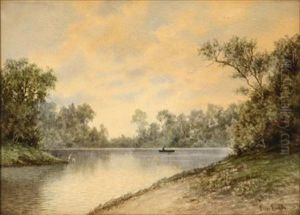Oskar Eschke Paintings
Oskar Eschke was a German artist born in 1892, whose work gained some recognition in the early 20th century. Eschke's artistic journey began in the vibrant cultural landscape of pre-World War I Germany, a period marked by significant innovations and tumultuous changes in the arts. Despite the overshadowing presence of more prominent figures of the time, Eschke managed to carve out a niche for himself, primarily through his contributions to painting and printmaking. His early works were influenced by the Expressionist movement, which sought to express emotional experience rather than impressions of the external world. This movement, characterized by its use of bold colors, exaggerated forms, and stark contrasts, provided a fertile ground for Eschke to explore and develop his unique style.
Throughout the 1920s and 1930s, Oskar Eschke's work evolved, reflecting the changing socio-political landscape of Germany and the broader European context. The rise of the Nazi regime and the onset of World War II had a profound impact on the artistic community in Germany, with many artists facing censorship or being deemed 'degenerate' by the regime. Eschke, like many of his contemporaries, navigated these challenges by adapting his themes and techniques, though always striving to maintain a degree of artistic integrity and personal expression. His later works, therefore, exhibit a more subdued palette and a shift towards more introspective themes, possibly reflecting the artist's response to the turmoil and devastation of the era.
Oskar Eschke's career was cut short by his death in 1947, just two years after the end of World War II. Despite the relatively modest scope of his fame, his contributions to German art, particularly in the realm of printmaking and painting, are noteworthy. Eschke's body of work offers valuable insights into the struggles and resilience of artists working under the shadow of oppressive regimes, and his artistic legacy continues to be studied by art historians and enthusiasts. His ability to adapt and evolve his style in response to the changing times serves as a testament to his dedication to his craft and his enduring spirit of creativity.
